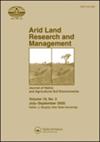Soil water migration under three tree species in response to water stress and extreme rainstorms
IF 1.6
4区 农林科学
Q3 ENVIRONMENTAL SCIENCES
引用次数: 0
Abstract
Abstract In arid and semi-arid areas, plant growth and survival are directly related to the soil water content. The soil water content is an important parameter for monitoring land degradation. A better understanding of how forests use soil water is crucial for the quantification how the terrestrial hydrologic cycle adapts to forestry practices and regional climate anomalies in these areas. This study investigated the variation of the water balance under different precipitation patterns (including soil water redistribution patterns under water stress and extreme rainstorms) under three common tree species in a mountainous area of Beijing were investigated. The results showed that soil water storage in the 80–150 cm layer played an important role for the ability of Platycladus orientalis (L.) Franco and Quercus variabilis Blume to survive drought during a dry season. Compared to P. orientalis and Q. variabilis, the duration of water stress was shortest for Pinus tabulaeformis Carr. (15 months). P. tabulaeformis had a higher ability to utilize top soil water but showed a less balanced use of soil water in each soil layer. It also had the strongest ability to replenish groundwater through deep seepage. P. tabulaeformis may resist drought by transferring water to deeper soil horizons, where it is less susceptible to evaporation and where moisture can be temporarily stored. P. orientalis and Q. variabilis are more dependent on soil water storage in response to water stress conditions.三种树种土壤水分迁移对水分胁迫和极端暴雨的响应
在干旱半干旱区,植物的生长和生存与土壤含水量直接相关。土壤含水量是监测土地退化的重要参数。更好地了解森林如何利用土壤水分对于量化陆地水文循环如何适应这些地区的林业实践和区域气候异常至关重要。以北京山区3种常见树种为研究对象,研究了不同降水模式(包括水分胁迫和极端暴雨条件下的土壤水分再分配模式)下土壤水分平衡的变化。结果表明,80 ~ 150 cm土层的土壤水分对侧柏(Platycladus orientalis, L.)生长能力起着重要作用。佛朗哥和栓皮栎在干旱季节生存下来。油松(Pinus tabulaeformis Carr)的水分胁迫持续时间最短。(15个月)。油松对表层土壤水分的利用能力较强,但各土层对土壤水分的利用不均衡。通过深层渗流补充地下水的能力最强。油松可以通过将水转移到较深的土壤层来抵抗干旱,在那里它不容易蒸发,并且可以暂时储存水分。在水分胁迫条件下,东方杉和变异松柏更依赖于土壤水分储存。
本文章由计算机程序翻译,如有差异,请以英文原文为准。
求助全文
约1分钟内获得全文
求助全文
来源期刊

Arid Land Research and Management
环境科学-环境科学
CiteScore
3.80
自引率
7.10%
发文量
23
审稿时长
9 months
期刊介绍:
Arid Land Research and Management, a cooperating journal of the International Union of Soil Sciences , is a common outlet and a valuable source of information for fundamental and applied research on soils affected by aridity. This journal covers land ecology, including flora and fauna, as well as soil chemistry, biology, physics, and other edaphic aspects. The journal emphasizes recovery of degraded lands and practical, appropriate uses of soils. Reports of biotechnological applications to land use and recovery are included. Full papers and short notes, as well as review articles and book and meeting reviews are published.
 求助内容:
求助内容: 应助结果提醒方式:
应助结果提醒方式:


